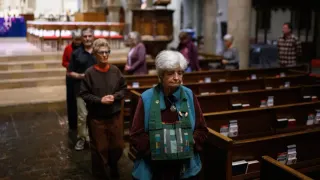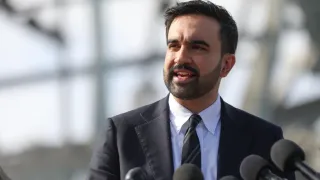February 27, 2024
West Virginia Medical Professionals Condemn Bill that Prohibits Care to At-Risk Transgender Youth
Leah Willingham READ TIME: 4 MIN.
Hundreds of medical professionals in West Virginia have signed a letter condemning a bill advancing in the House of Delegates that would bar transgender youth at risk for suicide from accessing medical interventions such as hormone therapy.
The bill before the full House would completely ban minors' access to hormone therapy and puberty blockers, removing a narrow exemption passed by lawmakers last year that allows kids at risk for self-harm and suicide to receive such care.
More than 400 people signed the letter published Monday by the state's only LGBTQ advocacy organization, Fairness West Virginia. They included doctors, psychologists, social workers, nurses and medical students.
"As clinicians, we want to be able to provide best practices in care and follow the guidelines of our ethical principles," West Virginia Psychological Association President Dr. Chava Urecki said in an interview. "The important thing is 'Do No Harm,' so we as a society and a discipline do need to protect the most vulnerable by allowing gender-affirming care and giving them the services that they deserve and need."
She said clients in the state have told providers that the proposal makes them feel "unsafe, unsupported and violates their right to privacy," adding she fears it will lead to an increase in hospitalizations.
Fairness West Virginia Communications Director Jack Jarvis said the organization planned to present the letter to delegates at the state Capitol in Charleston on Tuesday, the day before the bill faces a scheduled vote.
He said the swell of support the letter has received from medical professionals in the 72 hours since the bill was approved by the House Health and Human Resources Committee is telling.
"Frankly, I've never seen this level of support come together so quickly," Jarvis said. "Healthcare providers all across our state realize just how dangerous this bill is – they understand the stakes."
Up to 2% of adolescents in the United States identify as transgender, and in any given year a third of them may attempt suicide, the letter states. Research shows that transgender youth who access gender-affirming hormone therapy have 73% lower odds of considering suicide, it says.
"In many cases, this care can be life-saving," the letter reads.
At least 23 states have now enacted laws restricting or banning gender-affirming medical care for transgender minors, and most of those states face lawsuits.
Every major medical organization, including the American Medical Association, the American Academy of Pediatrics and the American Psychiatric Association, supports gender-affirming care for youths.
Lawmakers in West Virginia and other states advancing bans on transgender health care for youth and young adults often characterize gender-affirming treatments as medically unproven, potentially dangerous and a symptom of "woke" culture.
After the bill passed the committee on Friday, Lead Sponsor Republican Del. Geoff Foster said the law would be better, "more clear and concise" without the exemption, saying that will help reduce suicide rates is treatment for depression.
He may not believe in people receiving hormone therapy or puberty blockers, he said, but those 18 and older can make their own decisions, not kids.
Fairness West Virginia Gender Policy Manager Isabella Cortez, who is transgender, said it doesn't feel that way to her: "They don't want trans people to exist, kids or adults. Their goal is to get rid of us entirely."
Dr. Kate Waldeck, a pediatric critical care physician at Hoops Family Children's Hospital in the state's second-largest city of Huntington, said when she started there in 2017, easily more than half of the children she saw in the PICU after serious suicide attempts identified as transgender or nonbinary. Hoops usually admits one or two serious suicide attempts a week.
"Many of them I would see repeatedly, meaning after repeated attempts to take their own lives," she said.
She said the research is clear about the benefits of gender-affirming care for children experiencing severe gender dysphoria: "There is no controversy on this in the medical literature."
Waldeck spearheaded the creation of Huntington's Gender Affirming Pediatric Clinic in the fall of 2021, which is open one day a month and currently treats fewer than a dozen total patients under 18 with puberty blockers and hormone therapy. She receives no extra compensation for her work at the clinic, but said she does it because she sees the life-saving and changing impact the care can have for kids.
"These children are suffering. They are highly vulnerable," she said, adding that she never thought she'd do outpatient medicine again after her residency.
She called it "heartbreaking" that it has become a major political issue.
"Most of these kids would give anything to be 'normal' or 'under the radar,'" she said. "And now their struggles are being discussed by politicians and it has made life much harder for them."
Jarvis said that last year's bill has already forced dozens of families with the resources to move out of state to leave West Virginia. He said he knows others who have been denied access because the exemption in existing law is already so narrow. The 2023 law requires parental consent and a diagnosis of severe gender dysphoria from two medical professionals, both of whom must provide written testimony that medical interventions are necessary to prevent or limit possible or actual self-harm.
The bill's chances of passage are unclear. The House of Delegates passed a similar measure last year, but it was significantly altered by Republican Senate Majority Leader Tom Takubo, a physician who expressed concern about the high suicide rate for transgender youth.
Takubo, a physician, cited more than a dozen peer-reviewed studies showing a decrease in rates of suicide ideation and attempts among youth with severe gender dysphoria who had access to medication therapy.
Gender dysphoria is defined by medical professionals as severe psychological distress experienced by those whose gender identity differs from their sex assigned at birth.






